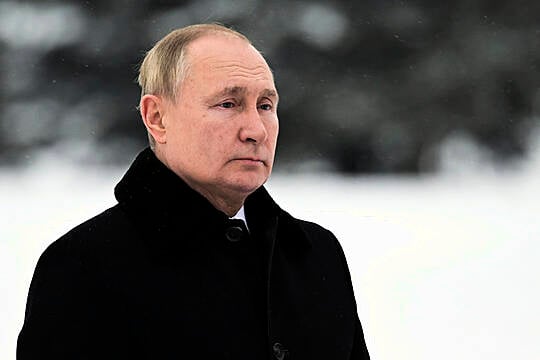Russia has said it will not start a war in Ukraine but warned that the US and Nato have ignored its demands and left little room for compromise.
President Vladimir Putin told French President Emmanuel Macron that the West has failed to consider Russia’s key conditions of halting further Nato expansion, stopping the deployment of alliance weapons near Russian borders, and rolling back its forces from eastern Europe, the Kremlin said.
The US and Nato formally rejected those demands this week, although Washington outlined areas where discussions are possible, offering hope that there could be a way to avoid war amid the build-up of more than 100,000 Russian troops near Ukraine.

US President Joe Biden on Thursday warned Ukrainian leader Volodymyr Zelenskyy that there is a “distinct possibility” that Russia could take military action against the former Soviet state in February. Moscow has repeatedly denied having any such plans.
Mr Zelenskyy sought to play down the war fears, saying western alarm over an imminent invasion has prompted many investors in the country’s financial markets to cash out.
“We don’t need this panic,” he said at a news conference on Friday. “It cost Ukrainians dearly.”
Mr Putin told Mr Macron that Moscow will study the US-Nato response before deciding its next move, according to the Kremlin. Earlier in the day, Mr Putin held a weekly meeting of his Security Council, saying only that it would address foreign policy issues.
He has made no public remarks about the western response, but foreign minister Sergei Lavrov said it leaves little chance for reaching agreement.

“While they say they won’t change their positions, we won’t change ours,” he told Russian radio stations in a live interview. “I don’t see any room for compromise here.”
“There won’t be a war as far as it depends on the Russian Federation, we don’t want a war,” he added. “But we won’t let our interests be rudely trampled on and ignored.”
Mr Lavrov said the US suggested the two sides could talk about limits on the deployment of intermediate-range missiles, restrictions on military drills and rules to prevent accidents between warships and aircraft.
He said that Russia proposed discussing those issues years ago, but Washington and its allies never took them up on it until now.
While welcoming Washington’s offers on confidence-building measures, he argued they are secondary to Russia’s main concerns about Nato.
He noted that international agreements say the security of one nation must not come at the expense of others, and that he would send letters to ask his western counterparts to explain their failure to respect that pledge.

“It will be hard for them to wiggle out from answering why they aren’t fulfilling the obligations sealed by their leaders not to strengthen their security at the expense of others,” he said, referring to a document signed at a 1999 summit of the Organisation for Security and Co-operation in Europe.
Washington has warned Moscow of devastating sanctions if it invades Ukraine, including penalties targeting senior Russian officials and key economic sectors.
Asked about possible sanctions, Mr Lavrov said Moscow had warned Washington that their introduction would amount to a complete severing of ties.
While Moscow and the West are mulling their next steps, Nato said it was bolstering its deterrence in the Baltic Sea region, and the US ordered 8,500 troops on higher alert for potential deployment to Europe.
Russia has launched military drills involving motorised infantry and artillery units in south-western Russia, warplanes in Kaliningrad on the Baltic Sea, and dozens of warships in the Black Sea and the Arctic.
Russian troops have also headed to Belarus for joint drills, raising western fears that Moscow could stage an attack on Ukraine from the north. The Ukrainian capital is just 50 miles from the border with Belarus.

Belarusian President Alexander Lukashenko said there will be no war unless Belarus or Russia come under attack, and accused the West of trying to “drown our Slavic brotherhood in blood”.
“The leaders of some countries have gone mad, they think they can win that war,” he said. “But there will be no victory, we will all lose.”
Ukrainian officials have repeatedly tried to project calm.
Mr Zelenskyy said the decision by the US, Britain, Australia, Germany and Canada to withdraw some of their diplomats and dependents from Kyiv was a “mistake”.
“Those were redundant steps that didn’t help,” he said.
He argued that internal destabilisation poses the greatest risk to the country, and bemoaned Nato’s failure to offer Ukraine a road map to membership, saying the alliance should state clearly if it does not plan to embrace Ukraine and not offer vague promises.
Mr Zelenskyy challenged the US warnings of an imminent Russian attack, insisting “we aren’t seeing any escalation bigger than before”, and charging that the Russian troop concentration could be part of Moscow’s attempts to exert “psychological pressure” and sow panic.







